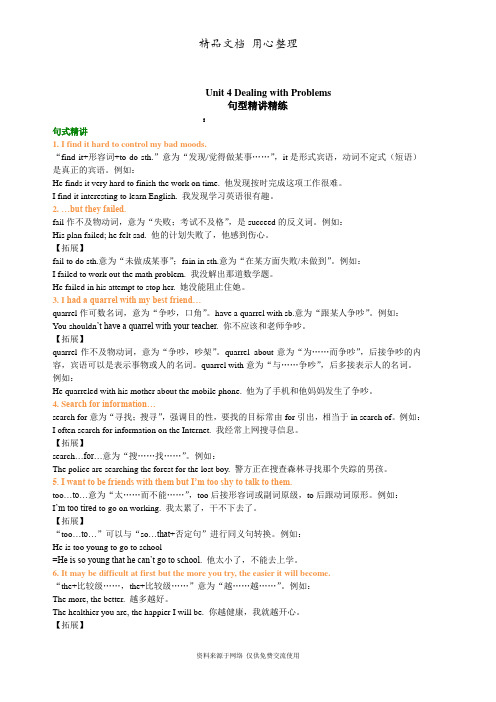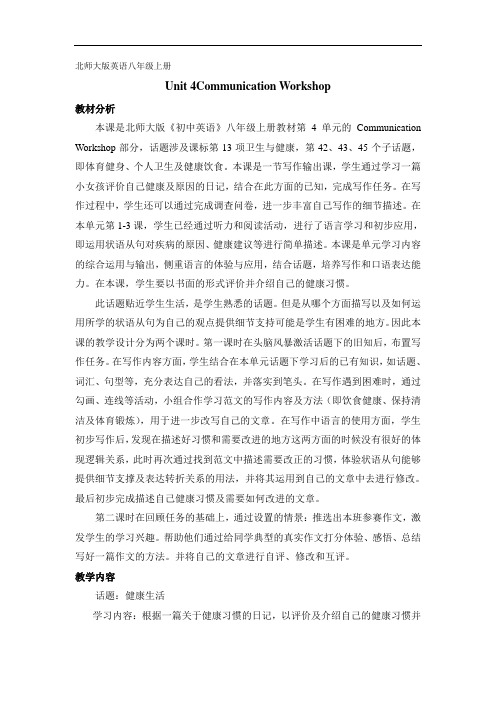北师大版初中英语八年级下册词汇讲解1Unit4 Dealing with Problems(词汇)
- 格式:doc
- 大小:63.50 KB
- 文档页数:5

Unit 1 School of the Future词汇精讲精练:词汇精讲1. popular(1)popular作形容词,意为“流行的,受人欢迎的”。
常用短语为be popular with,意为“受……的欢迎”。
例如:The most popular sport is football.最流行的运动是足球。
He is popular with our classmates.他在我们班里有人缘。
(2)popular作形容词,意为“民众的,大众的”。
例如:Popular education is one of our major objectives.民众教育是我们的主要目标之一。
He speaks in popular language.他用通俗的语言讲话。
【拓展】popularity作名词,意为“普及,流行,大众化”。
例如:Golf has gained popularity among the wealthy in my country. 高尔夫球已在我国富有的人中流行起来。
The popularity of p rivate cars is changing the people’s life style.私家车的普及正在改变着人们的生活方式。
2. inventioninvention作可数名词,意为“发明,创作”。
例如:Fax machines were a wonderful invention at the time.传真机在当时是一项了不起的发明。
【拓展】(1)invent 作动词,意为“发明,创造”。
例如:Edison invented the light bulb.爱迪生发明了电灯。
(2)invent还可以表示“虚构”。
例如:The whole story was invented.整个故事是虚构的。
(3)inventor作可数名词,意为“发明家;发明者”。
例如:Edison was a great inventor.爱迪生是一位伟大的发明家。




Unit 4 Dealing with Problems句型精讲精练:句式精讲1. I find it hard to control my bad moods.“find it+形容词+to do sth.”意为“发现/觉得做某事……”,it是形式宾语,动词不定式(短语)是真正的宾语。
例如:He finds it very hard to finish the work on time. 他发现按时完成这项工作很难。
I find it interesting to learn English. 我发现学习英语很有趣。
2. …but they failed.fail作不及物动词,意为“失败;考试不及格”,是succeed的反义词。
例如:His plan failed; he felt sad. 他的计划失败了,他感到伤心。
【拓展】fail to do sth.意为“未做成某事”;fain in sth.意为“在某方面失败/未做到”。
例如:I failed to work out the math problem. 我没解出那道数学题。
He failed in his attempt to stop her. 她没能阻止住她。
3. I had a quarrel with my best friend…quarrel作可数名词,意为“争吵,口角”。
have a quarrel with sb.意为“跟某人争吵”。
例如:You shouldn’t have a quarrel with your teacher. 你不应该和老师争吵。
【拓展】quarrel作不及物动词,意为“争吵,吵架”。
quarrel about意为“为……而争吵”,后接争吵的内容,宾语可以是表示事物或人的名词。
quarrel with意为“与……争吵”,后多接表示人的名词。
例如:He quarreled with his mother about the mobile phone. 他为了手机和他妈妈发生了争吵。

北师大版英语八年级上册Unit 4Communication Workshop教材分析本课是北师大版《初中英语》八年级上册教材第4单元的Communication Workshop部分,话题涉及课标第13项卫生与健康,第42、43、45个子话题,即体育健身、个人卫生及健康饮食。
本课是一节写作输出课,学生通过学习一篇小女孩评价自己健康及原因的日记,结合在此方面的已知,完成写作任务。
在写作过程中,学生还可以通过完成调查问卷,进一步丰富自己写作的细节描述。
在本单元第1-3课,学生已经通过听力和阅读活动,进行了语言学习和初步应用,即运用状语从句对疾病的原因、健康建议等进行简单描述。
本课是单元学习内容的综合运用与输出,侧重语言的体验与应用,结合话题,培养写作和口语表达能力。
在本课,学生要以书面的形式评价并介绍自己的健康习惯。
此话题贴近学生生活,是学生熟悉的话题。
但是从哪个方面描写以及如何运用所学的状语从句为自己的观点提供细节支持可能是学生有困难的地方。
因此本课的教学设计分为两个课时。
第一课时在头脑风暴激活话题下的旧知后,布置写作任务。
在写作内容方面,学生结合在本单元话题下学习后的已有知识,如话题、词汇、句型等,充分表达自己的看法,并落实到笔头。
在写作遇到困难时,通过勾画、连线等活动,小组合作学习范文的写作内容及方法(即饮食健康、保持清洁及体育锻炼),用于进一步改写自己的文章。
在写作中语言的使用方面,学生初步写作后,发现在描述好习惯和需要改进的地方这两方面的时候没有很好的体现逻辑关系,此时再次通过找到范文中描述需要改正的习惯,体验状语从句能够提供细节支撑及表达转折关系的用法,并将其运用到自己的文章中去进行修改。
最后初步完成描述自己健康习惯及需要如何改进的文章。
第二课时在回顾任务的基础上,通过设置的情景:推选出本班参赛作文,激发学生的学习兴趣。
帮助他们通过给同学典型的真实作文打分体验、感悟、总结写好一篇作文的方法。
Unit 4 Healthy LivingLesson 10 Going to the Doctor名词Nouns1. health健康;身体状况e.g.: Smoking can seriously damage your health.2. fever发烧,发热e.g.: Do you have a fever?3. headache头痛e.g.: I have a headache and a runny nose.4. throat咽喉,喉咙e.g.: He held the knife to her throat.5. stomachache胃痛e.g.: The patient’s stomachache stopped after he took the medicine.6. toothache牙痛e.g.: I’ve got a toothache.7. dentist牙医e.g.: I have to go to the dentist tomorrow.8. matter问题;事情e.g.: What’s the matter?9. temperature体温;温度,气温e.g.: The temperature has risen (by) five degrees.10. breath一次呼吸的空气e.g.: He recited the whole poem in one breath.11. flu流行感冒e.g.: The whole family has the flu.12. note(病假)证明;笔记e.g.: Please make a note of the dates.13. patient病人e.g.: There is one particular patient I’d like you to see.14. date日期e.g.: I can’t come on that date.15. symptom症状e.g.: Symptoms include a headache and sore throat.16. treatment治疗e.g.: He is receiving treatment for shock.形容词Adjectives1. runny 流鼻涕的e.g.: Symptoms are streaming eyes, a runny nose, headache and a cough.2. sore疼痛的,酸痛的e.g.: His feet were sore after the walk.3. deep深(呼吸)的;深的e.g.: She’s always been a deep one, trusting no one.4. serious严重的;严肃的e.g.: They pose a serious threat to security.副词Adverbs1. twice 两次,两遍e.g.: I don’t know him well; I’ve only met him twice.2. once一次e.g.: Take it once a day in the morning.代词Pronouns1. plenty 大量;充足e.g.: You should get plenty of rest.兼类词Words with Multiple Part of Speech1. cough n., v.咳嗽e.g.: I couldn’t stop coughing.2. cold n.感冒;冷adj.寒冷的e.g.: I’ve got a cold.短语Expressions1. plenty of 许多;大量e.g.: There are plenty of snacks for everyone.Lesson 11 Health Advice名词Nouns1. advice建议,劝告e.g.: They give advice for people with HIV and AIDS.2. soap肥皂e.g.: Should we wash our hands with soap 20 times a day?3. time次,回;时间e.g.: You don’t need to wash your hands 20 times a day.4. air空气;空中e.g.: Let’s go out for some fresh air.5. earphone耳机e.g.: It can hurt your ears when you listen to very loud music on earphones.6. volume音量;体积e.g.: You should make sure the volume is not too high.形容词Adjectives1. sleepy 困倦的,瞌睡的e.g.: You don’t want to feel sleepy during the day.2. harmful有害的e.g.: My dad smokes. He doesn’t think it’s harmful.兼类词Words with Multiple Part of Speech1. sneeze v.打喷嚏n.喷嚏e.g.: When people sneeze, we can get the flu from the air.2. harm n., v.伤害,损害e.g.: He may look fierce, but he means no harm.3. care n.照顾,小心v.关注,在意e.g.: How much do men share housework and the care of the children?4. wonder v.想知道;感到惊讶n.惊讶;奇迹e.g.: I wonder who she is.短语Expressions1. for example 例如e.g.: Let us suppose, for example, that you are married with two children.2. bird flu禽流感e.g.: At the moment, it’s very hard for people to get bird flu.Lesson 12 Healthy Bones名词Nouns1. bone骨头e.g.: The smallest bone in our body is in our head.2. blood血e.g.: The soft part of the bone makes our blood.3. nutrient营养;营养物e.g.: Blood carries nutrients through our bodies.4. calcium钙e.g.: We can get calcium easily from milk, some vegetables and other foods.5. vitamin维生素,维他命e.g.: Vitamin D is also important because it helps calcium work well in our bodies.6. stair楼梯e.g.: Running, jumping and dancing are all good exercise, but even daily activities like walking and climbing stairs can help keep our bones healthy and strong!7. lunchtime午餐时间e.g.: We always eat a good breakfast. We aren’t hungry before lunchtime.动词Verbs1. hold 拿着e.g.: Every time we walk, sit down or hold a book, we are using our bones.形容词Adjectives1. solid 坚硬的e.g.: Calcium makes our bones solid, so we need to get enough of it each day.连词Conjunctions1. although 尽管,虽然e.g.: Although we get vitamin D from food like fish and eggs, we can also get it from the sun.兼类词Words with Multiple Part of Speech1. outside n.外面,外部adj.外面的adv.在(或向)外面prep.在……外面e.g.: Bones are hard on the outside, but they are soft on the inside.2. inside n.里面,内部adj.里面的adv.在(或向)里面prep.在……里面e.g.: Inside the box was a gold watch.3. waste n. 废物;浪费v.浪费e.g.: It also helps move waste materials away so our bodies can stay healthy.Communication Workshop名词Nouns1. ping-pong乒乓球e.g.: I play ping-pong once a month, but I’m not very good at it.2. letter字母;信函e.g.: There’s a letter for you from your mother.形容词Adjectives1. less 较少的,更少的e.g.: I have a lot of good habits, but I need to eat less junk food and exercise more.兼类词Words with Multiple Part of Speech1. blank n.空白处adj.空白的e.g.: She turned to a blank page in her notebook.短语Expressions1. potato chip 薯片e.g.: I sometimes eat junk food, like hamburgers and potato chips.。
Unit4 Dealing with Problems单元练习初中英语北师大版八年级下册一、听力(听力)(共20小题;共20分)听力理解(共两节;满分20分)第一节(共5小题;每小题1分,满分5分)听下面五段对话。
每段对话后有一个小题,从题中所给的A、B、C三个选项中选出最佳选项,并在答题卡上将该项涂黑。
听完每段对话后,你都有10秒钟的时间来回答有关小题和阅读下一小题。
每段对话读两遍。
1. Whose pen is it?A. Tom's.B. Jim's.C. Bob's.2. Where are they?A. At a bookstore.B. At a clothes shop.C. At a restaurant.3. When's the boy's birthday?A. March 3rd.B. January 3rd.C. January 2nd.4. How does the man study for the English test?A. By asking the teacher for help.B. By doing homework.C. By listening to the tape.5. What does the man think of Mary?A. Lazy.B. Very hard-working.C. Clever.第二节(共15小题;每小题1分,满分15分)听下面五段对话或独白。
每段对话或独白后有几个小题,从题中所给的A、B、C三个选项中选出最佳选项,并在答题卡上将该项涂黑。
听每段对话或独白前,你将有时间阅读各个小题,每小题5秒钟;听完后,各小题将给出5秒钟的作答时间。
每段对话或独白读三遍。
听第6段材料,回答第6至第7两个小题。
现在你有10秒钟的时间阅读下面两个小题。
6. How does the boy get to school?A. On foot.B. By bike.C. By bus.7. How far is the boy's home from the school?A. 30 meters.B. 300 kilometers.C. 300 meters.听第7段材料,回答第8至第10三个小题。
北师⼤版初中英语⼋年级上册词汇讲解Uint5Helping(词汇)Unit 5 Helping词汇精讲精练:词汇精讲1. protectprotect作及物动词,意为“保护”。
常⽤搭配protect sb./sth. from…,意为“保护某⼈/某物免受……伤害”。
例如:We should protect rare animals.我们应该保护珍稀动物。
Parents protect their young from danger. ⽗母保护他们的⼉⼥不受伤害。
2. recyclerecycle作及物动词,意为“回收利⽤;再利⽤”。
例如:We should try to recycle all our waste paper. 我们应该竭⼒把所有废纸回收利⽤。
【拓展】recycling作不可数名词,意为“回收利⽤”。
例如:Recycling is important to help protect our environment. 回收利⽤对帮助我们保护环境很重要。
3. savesave作动词,意为“保存、储存、挽救、节省”等。
例如:How do you save the document? 你如何保存这个⽂件?(保存)The boy saves money to buy a pen. 那个男孩攒钱买钢笔。
(存储,节省)The police saved the girl’s life. 警察救了那个⼥孩的命。
(拯救)【拓展】(1)save…from(doing)…意为“拯救……免于……”。
例如Everything in his power wants to save the zoo from closing down.他所努⼒的每件事都想拯救动物园免于倒闭。
(2)save one’s life意为“救某⼈的命,帮某⼈⼤忙”。
例如:We can try our best to save his brother life. 我们能尽我们最⼤的努⼒去帮他弟弟的忙。
Unit 2 Communication词汇精讲精练:词汇精讲1. interestedinterested 作形容词,意为“感兴趣的”。
常用搭配是be interested in sth/doing sth 意为“某人对某物感兴趣或者对做某事感兴趣”。
而interesting 作形容词,表示“某人/某物是有趣的,使人感兴趣”。
例如:The story is very interesting, so all the children are interested in it.这个故事很有趣,所以所有的孩子都对它感兴趣。
Our English teacher is very interesting. 我们的英语教师很有趣。
He is interested in becoming a painter. 他对当画家很感兴趣(即一心想当画家)。
【拓展】2. missingmissing 作形容词,意为“失踪的,丢失的”,无比较等级。
其动词形式为miss 。
例如: I’ve found the missing bag. 我找到了那个丢失的包。
【拓展】invite 作及物动词,意为“邀请”,常用于下列结构:(1)invite sb. 意为“邀请某人”。
例如:Do you invite the friends in Beijing? 你邀请北京的朋友了吗?(2)invite sb. to some place 意为“邀请某人去某地”。
例如:Why don ’t you invite them to our school? 为什么不邀请他们来我们学校?(3) invite sb. to dinner 意为“邀请某人吃饭”。
例如:Li Lin often invites me to dinner. 李林经常邀请我吃饭。
(4) invite sb. to do sth. 意为“邀请某人做某事”。
例如:We invited our parents to come to our party. 我们邀请我们的父母来参加聚会。
Unit 4 Dealing with Problems词汇精讲精练:词汇精讲1. lonelylonely作形容词,意为“孤单的,寂寞的”。
例如:I was very lonely. 我很孤独。
例如:I feel lonely at home myself. 我自己在家里感到孤单。
He lives in a lonely village. 他住在一个荒凉的村庄里。
Tom is alone at home. Tom独自在家。
I went to Beijing alone. 我孤身一人去了北京。
2. offeroffer作及物动词,意为“提供;提出”,侧重于愿意给予。
offer sth.意为“提供某物”。
offer to do sth.意为“主动提出做某事”;offer sb. sth.(=offer sth. to sb.)意为“给某人提供某物”。
例如:They offered hot water on the train. 他们在火车上提供热水。
He offered to help me with my English. 他主动提出帮我学英语。
【拓展】provide作动词,意为“提供;供给”,多指为应付意外、紧急情况等作好充分准备而“供给;提供”。
常用结构为:provide sb. with sth.=provide sth. for sb.,意为“为某人提供某物”。
例如:Our school provides the students with good food.=Our school provides good food for the students. 我们学校为学生提供好的伙食。
3. stupidstupid作形容词,意为“傻的;笨的;愚蠢的”。
例如:I made a stupid mistakes. 我犯了个愚蠢的错误。
辨析:stupid, silly与foolish三者均有“傻的;笨的”之意,但在用法上有所区别:(1)stupid着重指生性迟钝或反应迟钝,相当于“笨”。
例如:She understands—s he’s not stupid.她明白——她又不笨。
(2)silly着重指头脑简单,不懂事,相当于“愚蠢”。
例如:Stop asking such silly questions! 不要再问这样愚蠢的问题了!(3)foolish着重指无头脑,缺乏智慧或判断力,相当于“傻”。
例如:It’s foolish of him to throw away such a good chance. 他丢掉这样一个好机会真是太傻了。
4. managemanage作及物动词,意为“完成(困难的事);应付(困难局面等)”,后接名词、代词或动词不定式作宾语。
例如:At last, he managed to finish the work on time. 最后,他总算按时完成了工作。
The maths problem is difficult, but I can manage it. 这道数学题很难,但我能完成它。
【拓展】manage作及物动词,还可意为“管理,负责”。
例如:He manages a school. 他管理一所学校。
5. unlessunless作连词,意为“除非”,引导条件状语从句。
若主句为一般将来时,则unless引导的条件状语从句应用一般现在时表将来。
例如:Don’t come unless I call you. 除非我打电话,否则你不要来。
You will get a good grade in the exam unless you don’t work hard.你会在考试中取得好成绩的,除非你不努力。
6. impoliteimpolite作形容词,意为“不礼貌的”,是polite的反义词,im-为否定前缀。
be impolite to sb.意为“对某人没有礼貌”。
例如:It’s impolite to smoke in public. 在公共场所吸烟是没有礼貌的。
He is impolite to the old. 他对老年人没有礼貌。
7. on one’s ownon one’s own意为“独自,单独”,相当于alone,其中one’s要随人称的变化而变化。
例如:I’m at home on my own today. 今天我独自在家。
Did you finish the work on your own? 你独自完成的那项工作吗?【拓展】of one’s own意为“某人自己的”。
例如:I have a bike of my own. 我有自己的自行车。
8. praisepraise作不可数名词,意为“赞扬,称赞”。
get praise from sb.意为“得到某人的赞扬”。
例如:T eachers’ praise encouraged him greatly. 老师们的表扬对他鼓舞很大。
Sometimes, I get praise from my parents. 有时我得到父母的称赞。
【括展】praise作及物动词,意为“赞扬,表扬”。
praise sb. for sth.意为“为某事表扬某人”。
例如:The boss praised Tom for his good work. 因工作出色老板夸赞了Tom。
9. strictstrict作形容词,意为“严格的,严厉的”。
be strict with sb.意为“对某人严格要求”。
例如:Mr. Li is strict with his students. 李老师对学生要求严格。
Marry is strict with herself. Marry对自己要求严格。
【拓展】be strict in sth. 意为“对某事要求严格”。
例如:He is strict in our school work. 他对我们的功课要求严格。
10. care aboutcare about意为“关心,在意”。
其中about为介词,其后可接名词、代词或动词-ing形式。
例如:He always cares about his grades too much. 他一直太在乎他的成绩。
I’m glad that you care about me. 我很高兴你关心我。
【拓展】(1)care for意为“照顾,喜欢”。
例如:I’ll care for your dog while you are away. 你不在时,我会照顾你的狗的。
(2)care作不可数名词,意为“照顾,照料”。
常用短语为take care of,意为“照顾”。
相当于look after。
例如:He likes to take care of the sick. 他喜欢照顾病人。
11. exceptexcept作介词,意为“除……之外”,后接名词、代词或从句等。
例如:We all went to the park except her. 除了她之外,我们都去了公园。
例如:We all passed the exam except Tom. 除了Tom之外,我们考试都及格了。
(Tom一人不及格)Besides English, he is good at French. 除了英语之外,他还擅长法语。
(他既擅长英语也擅长法语)12. messmess作名词,意为“杂乱,不整洁”。
be in a mess意为“乱七八糟,一团糟”;make a mess of意为“把……弄糟”。
例如:My bedroom is in a mess. It makes my mother angry. 我的卧室一团糟,这让我妈妈很生气。
I felt sad. I made a mess of things. 我感到很伤心。
我把事情搞砸了。
【拓展】mess作及物动词,意为“弄脏,弄乱”。
例如:I’m sorry to mess your new shoes. 很抱歉弄脏了你的新鞋子。
词汇精练I. 根据句意及首字母提示完成单词。
1. When the children grow up, the old always feel l .2. T him! He has no difficulty in working out the problem.3. The TV show didn’t interest us much. It's boring, I s .4. Talking loudly in public places is i .5. The boy often has good grades at school. His parents are s with him.6. Our English teacher tells us to speak e English every day.7. What a m you’ve made! You'd better clean it up before mum gets up.8. Tom is very l . He gets up late in the morning and often be late for school.9. About 5,000 cars were p in the factory last month.10. Our English teacher treats everyone equally. He is a f person.II. 单词拼写(根据中文提示填空)。
1. They have (困难) achieving a balance between study and hobbies.2. Mary was (不高兴) without a Christmas present.3. I like soft music. It always makes me (轻松的).4. That girl seems (满意的) with the color of her pretty dress.5. Don’t make friends with that (愚蠢的; 傻的) boy.III. 用所给单词的适当形式填空。
1. They are (happy)to see the bad result.2. Alice has (difficult)in spoken English.3. I feel (relax)after taking a walk.4. Bruce was (worry)about his health.5. There is a (strange)in his house.6. I’m sure if Bill(go)to the party, he (have)a great time.7. What (happen)if there is more pollution in the world?8. I’ll buy a new bike if I (have)enough money.9. You (not get)nervous if you (do)enough exercise.10. If Alice (be)kind to me, I (not argue)with her.V.听力链接。